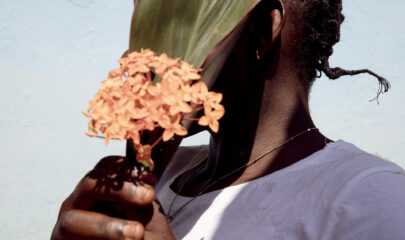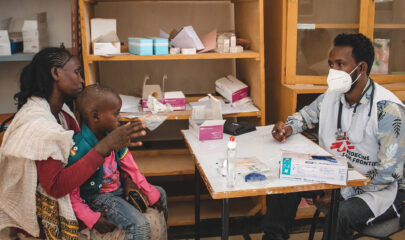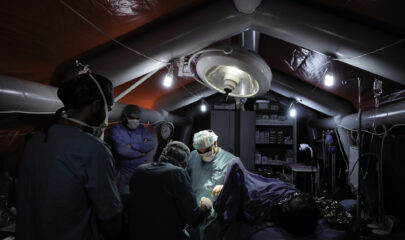
As COVID-19 continues to crowd headlines, the world’s humanitarian crises may be hidden from our view, but they are no less devastating for the people they harm. I recently returned from a five-week assignment with Doctors Without Borders/Médecins Sans Frontières (MSF) in Tigray, Ethiopia, working with mobile medical teams to help prop up a deliberately and systematically obliterated health system. Back in my home in Toronto, I’m appalled at how little attention is paid to this conflict and its impact on civilians. Often, homes were burnt to the ground. Since the beginning of the conflict, MSF teams have treated survivors of rape, imprisonment and other horrendous acts of intentional violence. And the scale is immense. Hundreds of thousands of people are displaced and exposed to violence. Millions of people need assistance. As members of a global community, we ought to hear more about this.
But I was also inspired. What drove us – my Ethiopian and internationally recruited colleagues in Tigray – is our shared purpose: to provide medical care and stand in solidarity with people in their most difficult moments. I feel both the responsibility and sense of fulfillment of being able to act decisively and in direct response to the needs we confront, whether or not the crisis features in Canadian media. This is only possible because of the trust placed in MSF by millions of individual supporters around the world. Being a part of our MSF donor community means you help enable MSF to plan and respond to emergencies as they unfold. That is why MSF is often one of the first responders – as in Tigray right now – and why we can act even when a crisis never hits headlines.
“…because we often support communities outside of public view, part of our job is to expose the impact of calamities, draw attention and provoke change.”
And because we often support communities outside of public view, part of our job is to expose the impact of calamities, draw attention and provoke change. Noma, for example, is a bacterial disease that destroys bone and tissue and leaves people severely disfigured. It is also a disease that affects people, especially children, experiencing poverty and poor nutrition. Part of MSF’s work in northern Nigeria is treating noma patients while calling attention to this preventable but highly neglected disease.
In this issue, we draw your attention to these and other less visible crises, such as in Central African Republic, where an epidemic of sexual violence is ongoing. And the war in Syria, which has largely faded from the spotlight even though the needs of millions of people haven’t diminished. We also highlight MSF’s work with 3D printed prosthetic limbs to support people who have survived physical trauma.
None of this is possible without the entire MSF community that includes our staff and our supporters the world over. Thank you for being part of it.
PLEASE DONATE NOW
More than 95 per cent of MSF’s funding comes from private donors like you, rather than from governments or large institutions. This gives us the independence to act based on medical need alone, free from outside interference.
We need your help again today. Please donate now to help MSF continue responding to humanitarian crises around the world, including those that are underreported or neglected. Thank you.
MSF IN ACTION

Mediterranean Sea. In May 2021, Doctors Without Borders/Médecins Sans Frontières (MSF) relaunched search and rescue activities in the central Mediterranean Sea (photo above), providing emergency medical care to refugees and migrants attempting the deadly sea crossing from Libya. Since 2015, MSF teams working on search and rescue ships have witnessed with horror the tragedy on Europe’s doorstep, as thousands of people drown at sea or are forcibly returned to horrific conditions in Libya. On Aug. 23 and 24, 2020 (cover photo), the MSF-supported ship SeaWatch4 rescued over 200 men, women and children in distress. In one situation, many survivors were hypothermic, disoriented and smelled strongly of gasoline. Emergency showers were provided for fuel exposure. Many said they never thought they would survive the voyage.
Peru. COVID-19 hit Peru with fierce force in April 2021, driving medical staff and hospitals to the brink of collapse. High COVID-19 mortality meant the country had one of the highest number of deaths per capita globally at the time. MSF teams scaled up activities to help the struggling healthcare system, treating patients north of Lima. Their work had two main objectives: taking pressure off the local healthcare system with a supporting facility to treat COVID-19 patients, and working with community networks to improve early detection, identifying patients and providing them with care before their condition worsened and they ended up in critical condition.
Mozambique. Over the past year, long-simmering violence has escalated in Mozambique’s Cabo Delgado province as government forces clash with a non-state armed group, with civilians bearing the brunt of the fighting. Nearly 700,000 people – almost one-third of the province’s population – have been forced to flee their homes, often with nothing but the few possessions they can carry with them. Dozens of health facilities have been destroyed or rendered inoperable by the conflict, cutting people off from essential medical care and increasing the risk of disease outbreaks. MSF teams are working throughout the region, running mobile clinics to provide primary healthcare consultations and malnutrition screening, improving water and sanitation services for displaced people and operating referral systems, among other activities.


